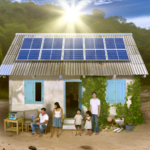Introduction to Portable Solar Generators
What Are Portable Solar Generators?
Portable solar generators are compact, self-contained units designed to harness solar energy and convert it into electrical power. Unlike traditional generators that rely on fuel combustion, these devices use solar panels to capture sunlight and convert it into electricity through photovoltaic cells. This electricity is then stored in a built-in battery for later use. Typically, a portable solar generator consists of three main components: solar panels, a battery storage system, and an inverter. The inverter converts the stored DC power into AC power, making it suitable for powering various electronic devices and small appliances.
Why Choose Solar Power for Off-Grid Living?
Choosing solar power for off-grid living offers numerous advantages, making it an increasingly popular choice for those seeking independence from traditional power grids. Here are some compelling reasons to opt for solar power:
- Renewable Energy Source: Solar power is a clean, renewable energy source that reduces reliance on fossil fuels and minimizes environmental impact.
- Cost Savings: While the initial investment in solar technology can be significant, the long-term savings on energy bills can be substantial. Solar power systems often pay for themselves over time.
- Energy Independence: Solar power provides a reliable and independent energy source, crucial for off-grid living where access to traditional power grids is limited or non-existent.
- Low Maintenance: Solar power systems require minimal maintenance compared to traditional generators, which need regular fuel and oil changes.
- Quiet Operation: Unlike noisy fuel-powered generators, solar generators operate silently, making them ideal for peaceful, off-grid environments.
Benefits of Using Portable Solar Generators
Portable solar generators offer a range of benefits that make them an attractive option for various applications, from camping trips to emergency preparedness. Here are some key advantages:
- Portability: As the name suggests, portable solar generators are designed to be easily transported. Their compact size and lightweight design make them perfect for outdoor adventures, camping, and other off-grid activities.
- Versatility: These generators can power a wide array of devices, including smartphones, laptops, lights, small appliances, and even medical equipment. This versatility makes them suitable for diverse needs.
- Eco-Friendly: By using solar energy, these generators produce zero emissions, contributing to a cleaner and healthier environment.
- Ease of Use: Portable solar generators are user-friendly, often featuring plug-and-play functionality. This ease of use makes them accessible to individuals with limited technical knowledge.
- Emergency Power: In the event of a power outage, a portable solar generator can provide a reliable backup power source, ensuring that essential devices remain operational.
In summary, portable solar generators are an innovative and practical solution for those seeking to embrace an off-grid lifestyle. They offer the benefits of renewable energy, cost savings, and energy independence, all while being easy to use and environmentally friendly. Whether you’re an outdoor enthusiast, a prepper, or someone looking to reduce their carbon footprint, a portable solar generator can be a valuable addition to your off-grid toolkit.
Key Features to Consider
When selecting a portable solar generator for your off-grid lifestyle, it’s essential to consider several key features to ensure you choose the right model for your needs. Here are the most critical aspects to evaluate:
Power Output and Capacity
The power output and capacity of a portable solar generator are fundamental factors to consider. **Power output** is measured in watts (W) and indicates the maximum amount of power the generator can supply at any given time. **Capacity**, measured in watt-hours (Wh), represents the total amount of energy the generator can store.
– **Power Output**: Ensure the generator can handle the peak power requirements of your devices. For instance, if you plan to run a refrigerator (which may require 800W) and a few lights (totaling 200W), you’ll need a generator with at least 1000W output.
– **Capacity**: This determines how long the generator can power your devices. For example, a generator with a 1000Wh capacity can theoretically run a 100W device for 10 hours (1000Wh / 100W = 10 hours).
Portability and Weight
Portability is a crucial feature, especially if you plan to use the generator for activities like camping, boating, or moving it around your property. The weight and design of the generator significantly impact its portability.
– **Weight**: Lighter models (under 20 pounds) are easier to carry and transport, making them ideal for camping and outdoor adventures. Heavier models (over 50 pounds) may offer more power but can be cumbersome to move.
– **Design**: Look for features like built-in handles, wheels, and compact dimensions to enhance portability. Some models are designed to be rugged and durable, suitable for outdoor use.
Battery Type and Storage
The type of battery used in a solar generator affects its performance, lifespan, and maintenance requirements. Common battery types include:
– **Lithium-Ion**: These batteries are lightweight, have a high energy density, and offer a longer lifespan compared to other types. They are ideal for frequent use and portability.
– **Lead-Acid**: These are heavier and have a shorter lifespan but are generally more affordable. They are suitable for stationary applications where weight is not a concern.
– **LiFePO4 (Lithium Iron Phosphate)**: These batteries offer excellent safety, long cycle life, and stable performance. They are becoming increasingly popular for off-grid applications.
Durability and Build Quality
Durability is essential for a portable solar generator, especially if it will be used in harsh environments. Consider the following aspects:
– **Build Quality**: Look for generators with robust construction, such as aluminum or high-quality plastic casings, to withstand rough handling and outdoor conditions.
– **Weather Resistance**: Some models offer water and dust resistance, which can be crucial for outdoor use. Check the IP rating (Ingress Protection) to understand the level of protection against environmental factors.
Ease of Use and Setup
A user-friendly design can make a significant difference in your experience with a portable solar generator. Consider the following features:
– **Setup**: Look for generators that are easy to set up, with clear instructions and minimal assembly required. Plug-and-play models are particularly convenient.
– **Interface**: A clear and intuitive interface, such as an LCD screen, can help you monitor power usage, battery status, and other important metrics.
– **Connectivity**: Ensure the generator has a variety of output ports (AC, DC, USB) to accommodate different devices. Some models also offer wireless charging and app connectivity for remote monitoring and control.
By carefully evaluating these key features, you can select a portable solar generator that meets your power needs, is easy to transport, and offers reliable performance for your off-grid lifestyle.
Types of Portable Solar Generators
Small and Lightweight Models
Small and lightweight portable solar generators are ideal for those who need a compact and easily transportable power solution. These models are perfect for short camping trips, picnics, or as a backup power source for small electronic devices. Typically, they offer power outputs ranging from 100 to 500 watts and have battery capacities between 150 to 500 watt-hours (Wh).
**Advantages:**
– **Portability:** These units are designed to be carried easily, often weighing less than 10 pounds.
– **Ease of Use:** Simple plug-and-play functionality makes them user-friendly.
– **Quick Charging:** Smaller batteries mean faster charging times, both via solar panels and AC outlets.
**Disadvantages:**
– **Limited Capacity:** Not suitable for powering large appliances or for extended use.
– **Lower Power Output:** Can only handle small devices like smartphones, tablets, and LED lights.
**Examples:**
– **Jackery Explorer 240:** With a 240Wh battery and 200W output, this model is perfect for short trips and small devices.
– **Goal Zero Yeti 200X:** Offers 187Wh capacity and 120W output, ideal for lightweight and portable power needs.
Mid-Range Models
Mid-range portable solar generators strike a balance between portability and power capacity. These models are suitable for longer camping trips, RV use, and as a more robust backup power source for home emergencies. They typically offer power outputs between 500 to 1500 watts and have battery capacities ranging from 500 to 1500 watt-hours.
**Advantages:**
– **Versatility:** Can power a wider range of devices, including small appliances like mini-fridges and CPAP machines.
– **Moderate Portability:** While heavier than small models, they are still manageable for transport.
– **Extended Use:** Larger battery capacities allow for longer usage times.
**Disadvantages:**
– **Heavier:** These units can weigh between 20 to 50 pounds, making them less convenient to carry.
– **Longer Charging Times:** Larger batteries require more time to charge fully.
**Examples:**
– **Bluetti AC50S:** With a 500Wh battery and 300W output, this model is great for moderate power needs.
– **EcoFlow River Pro:** Offers 720Wh capacity and 600W output, suitable for a variety of applications.
High-Capacity Models
High-capacity portable solar generators are designed for those who need substantial power for extended periods. These models are ideal for off-grid living, emergency home backup, and powering multiple large appliances. They typically offer power outputs exceeding 1500 watts and have battery capacities ranging from 1500 to 5000 watt-hours or more.
**Advantages:**
– **High Power Output:** Can handle heavy-duty appliances like refrigerators, power tools, and even small air conditioners.
– **Extended Use:** Large battery capacities ensure long-lasting power supply.
– **Multiple Ports:** Often come with a variety of output ports, including AC, DC, USB, and even 12V car ports.
**Disadvantages:**
– **Heavy and Bulky:** These units can weigh over 50 pounds, making them less portable.
– **Expensive:** Higher capacity and advanced features come at a premium price.
**Examples:**
– **EcoFlow Delta Pro:** With a massive 3600Wh battery and 3600W output, this model is perfect for off-grid living and emergency backup.
– **Bluetti AC200P:** Offers 2000Wh capacity and 2000W output, suitable for powering multiple large appliances simultaneously.
In summary, the type of portable solar generator you choose should align with your specific power needs and portability requirements. Small and lightweight models are great for short trips and small devices, mid-range models offer a balance of power and portability, and high-capacity models are ideal for extended use and powering large appliances.
How to Use and Maintain Your Portable Solar Generator
Initial Setup and Installation
Setting up your portable solar generator correctly is crucial for optimal performance. Begin by unboxing the generator and all its components, including the solar panels, cables, and any additional accessories. **Follow these steps for a smooth setup:**
1. **Choose an Ideal Location:** Place the solar panels in a location that receives maximum sunlight throughout the day. Ensure the area is free from obstructions like trees or buildings.
2. **Connect the Solar Panels:** Attach the solar panels to the generator using the provided cables. Make sure the connections are secure to avoid any power loss.
3. **Charge the Battery:** Before using the generator, fully charge the battery. This may take several hours depending on the battery capacity and the amount of sunlight available.
4. **Test the Generator:** Once charged, test the generator by plugging in a small device to ensure it is working correctly.
Daily Operation and Best Practices
To get the most out of your portable solar generator, follow these daily operation tips and best practices:
– **Monitor Power Usage:** Keep an eye on the power consumption of the devices you connect to the generator. Avoid overloading the generator by staying within its recommended power capacity.
– **Optimize Sunlight Exposure:** Regularly adjust the position of the solar panels to maximize sunlight exposure. This will ensure efficient charging throughout the day.
– **Turn Off When Not in Use:** To conserve battery life, turn off the generator when it is not in use. This will also help extend the overall lifespan of the battery.
– **Use High-Quality Cables:** Always use high-quality cables and adapters to connect your devices. Poor-quality cables can lead to power loss and potential damage to both the generator and your devices.
Maintenance Tips and Troubleshooting
Regular maintenance is essential to keep your portable solar generator in top working condition. Here are some maintenance tips and troubleshooting advice:
– **Keep It Clean:** Dust and debris can accumulate on the solar panels, reducing their efficiency. Clean the panels regularly with a soft cloth and mild detergent.
– **Inspect Connections:** Periodically check all connections for any signs of wear or looseness. Tighten any loose connections to ensure efficient power transfer.
– **Store Properly:** When not in use, store the generator in a cool, dry place. Avoid exposing it to extreme temperatures or moisture, as this can damage the internal components.
– **Check Battery Health:** Over time, the battery’s capacity may degrade. Monitor the battery’s performance and replace it if you notice a significant drop in efficiency.
– **Troubleshoot Issues:** If the generator malfunctions, refer to the user manual for troubleshooting steps. Common issues include loose connections, depleted batteries, or faulty solar panels. If the problem persists, contact the manufacturer for professional assistance.
By following these guidelines, you can ensure that your portable solar generator remains reliable and efficient, providing you with sustainable power for your off-grid lifestyle.
Real-World Applications
Camping and Outdoor Adventures
Portable solar generators are a game-changer for camping and outdoor adventures. Imagine setting up camp in a remote location and still having the ability to power essential devices like lights, a portable fridge, or even a small fan. **Portable solar generators** provide a reliable and eco-friendly power source, allowing you to enjoy the great outdoors without sacrificing comfort. Many models are designed to be lightweight and easy to carry, making them perfect for hiking trips or weekend getaways. With the ability to recharge via solar panels, you can stay off the grid for extended periods without worrying about running out of power.
Emergency Preparedness
In times of emergency, having a portable solar generator can be a lifesaver. Power outages can occur unexpectedly due to natural disasters like hurricanes, earthquakes, or severe storms. A portable solar generator ensures that you can keep essential devices running, such as medical equipment, communication devices, and refrigeration for perishable food. **High-capacity models** can power multiple devices for several days, providing peace of mind during uncertain times. Additionally, the ability to recharge the generator using solar panels means you won’t be dependent on fuel supplies, which can be scarce during emergencies.
Living Off-Grid
For those who choose to live off-grid, portable solar generators offer a sustainable and reliable power solution. Whether you’re in a remote cabin, a tiny house, or an RV, these generators can provide the electricity needed for daily living. **Mid-range and high-capacity models** are particularly suited for off-grid living, as they can power larger appliances and multiple devices simultaneously. By harnessing solar energy, you can reduce your reliance on traditional power sources and lower your carbon footprint. This not only benefits the environment but also provides a sense of independence and self-sufficiency.
Boating and Marine Use
Boating enthusiasts and those living on houseboats can greatly benefit from portable solar generators. These generators can power navigation systems, lights, and other essential equipment, ensuring a safe and enjoyable experience on the water. **Durable and weather-resistant models** are ideal for marine environments, as they can withstand the harsh conditions often encountered at sea. The ability to recharge using solar panels means you can stay out on the water longer without needing to return to shore for power. This makes portable solar generators an excellent choice for extended sailing trips or living aboard a boat.
Environmental Impact and Sustainability
Reducing Your Carbon Footprint
Portable solar generators offer a significant advantage in reducing your carbon footprint. Unlike traditional generators that rely on fossil fuels, solar generators harness the power of the sun, a clean and renewable energy source. By using solar energy, you can minimize greenhouse gas emissions and reduce your reliance on non-renewable resources. This shift not only helps in combating climate change but also promotes a more sustainable and eco-friendly lifestyle.
Sustainable Living Practices
Incorporating portable solar generators into your daily life can be a cornerstone of sustainable living practices. Here are some ways to integrate these devices into a more eco-conscious lifestyle:
- Energy Independence: By generating your own power, you reduce dependence on the grid, which often relies on fossil fuels.
- Resource Conservation: Solar generators require minimal maintenance and have a long lifespan, reducing the need for frequent replacements and conserving resources.
- Off-Grid Living: For those living off-grid, solar generators provide a reliable and sustainable power source, enabling a self-sufficient lifestyle.
- Emergency Preparedness: In times of natural disasters or power outages, solar generators offer a dependable backup power source without the environmental impact of traditional generators.
Future of Solar Technology
The future of solar technology is promising, with continuous advancements making solar generators more efficient, affordable, and accessible. Here are some trends and innovations to watch for:
- Improved Efficiency: Advances in photovoltaic cell technology are increasing the efficiency of solar panels, allowing them to capture more sunlight and generate more power.
- Energy Storage: Innovations in battery technology, such as lithium iron phosphate (LiFePO4) batteries, are enhancing the storage capacity and lifespan of solar generators.
- Smart Technology: Integration with smart technology and IoT (Internet of Things) is making solar generators more user-friendly, with features like remote monitoring and automated energy management.
- Cost Reduction: As technology advances and production scales up, the cost of solar generators is expected to decrease, making them more accessible to a broader audience.
- Environmental Impact: Continued research and development are focused on reducing the environmental impact of solar panel production and disposal, making the entire lifecycle of solar technology more sustainable.
By embracing portable solar generators, you not only contribute to a more sustainable future but also benefit from the ongoing advancements in solar technology. This makes it an opportune time to invest in solar power solutions that align with both your energy needs and environmental values.
Conclusion
Summary of Key Points
In this article, we have delved into the world of portable solar generators, exploring their significance for off-grid living. We began by understanding what portable solar generators are and why they are an excellent choice for sustainable, off-grid lifestyles. We then examined the key features to consider when selecting a solar generator, such as power output, portability, battery type, durability, and ease of use. Additionally, we categorized different types of portable solar generators based on their capacity and use cases. Practical advice on using and maintaining these generators was provided, along with real-world applications ranging from camping to emergency preparedness. Finally, we discussed the environmental impact and sustainability benefits of using solar power.
Final Thoughts on Choosing the Right Portable Solar Generator
Choosing the right portable solar generator depends on your specific needs and circumstances. For those who require a lightweight and easily transportable option, small and mid-range models may be ideal. These are perfect for camping trips, outdoor adventures, and short-term power outages. On the other hand, high-capacity models are better suited for more demanding applications, such as powering a family home during extended outages or supporting off-grid living in remote areas. When making your decision, consider factors like power output, battery capacity, and the types of devices you need to power. Additionally, think about the generator’s portability, ease of setup, and overall durability to ensure it meets your long-term needs.
Encouragement to Embrace Sustainable Power Solutions
Embracing portable solar generators is not just a practical choice; it is a step towards a more sustainable and environmentally friendly lifestyle. By harnessing the power of the sun, you reduce your reliance on fossil fuels, lower your carbon footprint, and contribute to a cleaner planet. Whether you are an outdoor enthusiast, a homeowner preparing for emergencies, or someone seeking to live off-grid, portable solar generators offer a reliable and renewable energy solution. As technology continues to advance, these generators will become even more efficient and accessible, making it easier for everyone to adopt sustainable power solutions. So, take the leap and explore the benefits of portable solar generators—your future self and the planet will thank you.






